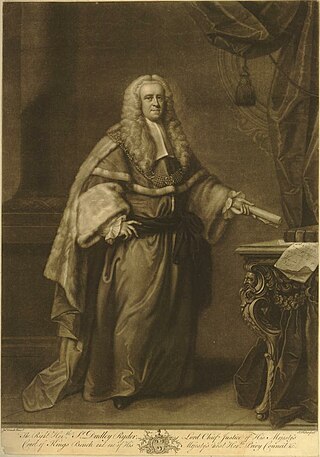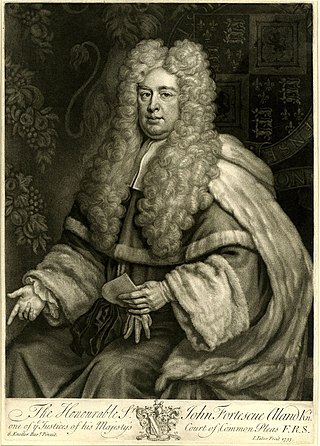
Henry Fielding was an English writer and magistrate known for the use of humour and satire in his works. His 1749 comic novel The History of Tom Jones, a Foundling was a seminal work in the genre. Along with Samuel Richardson, Fielding is seen as the founder of the traditional English novel. He also played an important role in the history of law enforcement in the United Kingdom, using his authority as a magistrate to found the Bow Street Runners, London's first professional police force.

Sir William Blackstone was an English jurist, justice and Tory politician most noted for his Commentaries on the Laws of England, which became the best-known description of the doctrines of the English common law. Born into a middle-class family in London, Blackstone was educated at Charterhouse School before matriculating at Pembroke College, Oxford, in 1738. After switching to and completing a Bachelor of Civil Law degree, he was made a fellow of All Souls College, Oxford, on 2 November 1743, admitted to Middle Temple, and called to the Bar there in 1746. Following a slow start to his career as a barrister, Blackstone became heavily involved in university administration, becoming accountant, treasurer and bursar on 28 November 1746 and Senior Bursar in 1750. Blackstone is considered responsible for completing the Codrington Library and Warton Building, and simplifying the complex accounting system used by the college. On 3 July 1753 he formally gave up his practice as a barrister and instead embarked on a series of lectures on English law, the first of their kind. These were massively successful, earning him a total of £453, and led to the publication of An Analysis of the Laws of England in 1756, which repeatedly sold out and was used to preface his later works.

Robert Bannatyne Finlay, 1st Viscount Finlay,, known as Sir Robert Finlay from 1895 to 1916, was a British barrister and politician who was Lord High Chancellor of Great Britain from 1916 to 1919.

Sir Dudley Ryder, was an English lawyer, writer and politician who sat in the British House of Commons from 1733 until 1754 when he was appointed Chief Justice of the King's Bench.
Archibald Hutcheson was a British politician who sat in the House of Commons from 1713 to 1727.

John Glynn Serjeant-at-law of Glynn (1722–1779) was an English lawyer and politician who sat in the House of Commons from 1768 to 1779. Glynn was born to a family of Cornish gentry. He inherited his father's estate at Glynn in the parish of Cardinham, Cornwall, on the deaths of his elder brother and his nephew.
The nominate reports, also known as nominative reports, named reports and private reports, are the various published collections of law reports of cases in English courts from the Middle Ages to the 1860s.
Sir Edward Hyde East, 1st Baronet was a British Member of Parliament, legal writer, and judge in India. He served as chief justice of Calcutta from 1813 to 1822. He was the first Principal of Hindu College.

Sir John Comyns, of Writtle in Essex, was an English judge and Member of Parliament.

Harry Peckham was a King's Counsel, judge and sportsman who toured Europe and wrote a series of letters which are still being published over 200 years later. Peckham was a member of the committee that drew up early laws of cricket including the first inclusion of the leg before wicket (lbw) rule. The diarist James Woodforde makes reference to Peckham playing cricket at Oxford in 1760. and he was still playing in 1771.

Sir George Treby JP (1643–1700), of Plympton, Devon, and of Fleet Street in the City of London, was Lord Chief Justice of the Common Pleas and six times Member of Parliament for the Rotten Borough of Plympton Erle, Devon, largely controlled by him and his descendants until abolished by the Great Reform Act of 1832.

Sir Henry Pollexfen of Nutwell in the parish of Woodbury, Devon, was Lord Chief Justice of the Common Pleas.

John Fortescue Aland, 1st Baron Fortescue of Credan was an English lawyer, judge, politician and peer who sat in the British House of Commons from 1715 to 1717. Aland wrote on English legal and constitutional history, and was said to have influenced Thomas Jefferson. A member of both the Middle Temple and Inner Temple, he became a King's Counsel in 1714 and was then appointed Solicitor General, first to the Prince of Wales and then to his father George I in 1715. After a short stint as a member of parliament, Aland was knighted and elevated to the Bench as a Baron of the Exchequer in 1717. He was subsequently a justice of the Court of King's Bench (1718–1727) and of the Court of Common Pleas (1728–1746), save for a brief hiatus between 1727 and 1728 which has been attributed to George II's displeasure with one of his legal opinions.
Sir John Strange was a British politician and judge.
Sir Bartholomew Shower (1658–1701) was an English lawyer and politician, Recorder of London and a distinguished High Tory.

William Shippen was an English Jacobite and Tory politician who sat in the House of Commons from 1707 to 1743.
Roger Acherley was an English lawyer, constitutional writer and politician.
William Newland Welsby was a legal writer who was born in Acton, Cheshire about 1802, was the only son of William Welsby of the Middle Temple, gentleman.

Sir William Whitelock KC was an English barrister and Tory politician. His name is also spelt Whitelocke and Whitlock.
John Bruce Williamson KC (1859–1938) was a British barrister and historical author.











